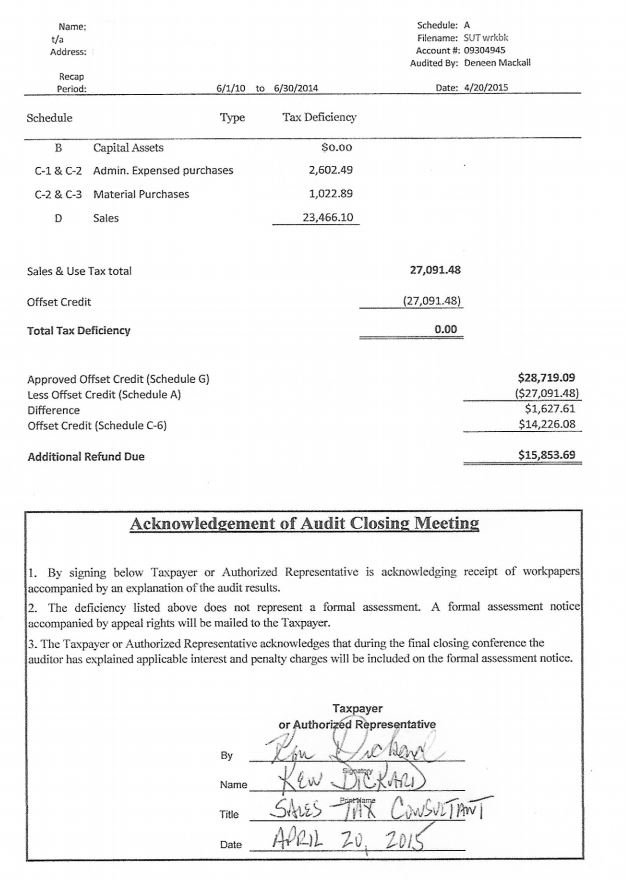MD Case Study – Countertop Manufacturer and Installer
MD Tax Assessment Amount – $43,982.98
Reduction Amount – $16,891.50 – 38%
Approved Offset Credit/ Refund – $42,945.17
Interest and Penalty Savings – $17,593.19
Refund Check Received – $15,853.69
Maryland countertop manufacturer and installer was selected by the Comptroller’s Office for a Maryland sales and use tax audit. This taxpayer had never been audited before and Marsu was recommended by the Taxpayer’s accountant to assist in the audit process. Luckily, we were contacted as the initial workpapers were issued and Marsu was able to review the workpapers with the field auditor and supervisor. No informal hearing was needed. Like any other audit, the auditor reviewed a sample period of sales and expenses and projected the assessment over the audit period and reviewed all asset purchases. Marsu assisted the Taxpayer in reviewing each schedule as follows:
- The auditor reviewed six months of sales invoices and listed only 7 invoices as taxable. Marsu pulled the job folders to prove to the auditor how the three invoices were not taxable. The jobs that were removed were either a residential install or for resale. The sales schedule ended up with just 4 taxable invoices where tax was not properly collected. The tax assessed was reduced from $37,202.14 to $23,466.10, a savings of $13,736.04.
- The auditor reviewed three months of material (COGS) expense invoices and listed only 9 invoices as taxable. Marsu reviewed each line item and provided documentation to the auditor to have one line deleted and one line reduced. Even though Marsu only change two lines, the changes reduced the dollar value of the invoices listed by 32% and the tax due was reduced from $2,390.78 to $1,022.89, a tax savings of $1,367.89.
- The auditor created a second expense schedule for administrative expenses and again reviewed six months of invoices. There were 22 lines listed. Marsu reviewed each line and was able to prove to the auditor that either tax was paid or the invoice was a non-taxable transaction for nine lines. The tax due for this schedule was reduced from $$4,390.06 to $2,602.49, a savings of $1,787.57.
- The auditor reviewed every asset purchased during the audit period and the Taxpayer had properly paid sales tax to the vendor.
Marsu also performed a reverse audit and documented sales taxes paid in error and the Comptroller’s Office approved and included the refunds in the amount of $42,945.17 in the audit workpapers as required by law. The original workpapers had the Taxpayer owing $43,982.98 in taxes and the final workpapers had the Taxpayer receiving a refund check in the amount of $15,853.69, a savings of $59,836.67. Since the Taxpayer received a refund, there was no interest and penalty assessed. Without the refund, interest would have been assessed at approximately 30% and penalty at 10% to the total tax due of $27,091.48.
Main Tax Issue in Audit
Countertop manufacturers have been a favorite audit target of the Comptroller’s Office for years. If the Taxpayer is not collecting tax properly, then the assessment will be in the tens of thousands of dollars or even in hundreds of thousands of dollars depending on the size of the company and type of work performed.
Fifteen years or so ago, the Comptroller’s Office added the infamous two sentences to Maryland Tax Regulation .19 – Real Property Construction, Improvement, Alteration and Repair that sums up the Comptroller’s position of taxability when auditing a countertop installer. “As a general rule, counters, countertops, and cabinetry installed in commercial spaces will be treated as tangible personal property. Doors, windows, molding, built-ins, and kitchen cabinetry installed in residential or commercial spaces will be treated as realty”. So if a Taxpayer does commercial work and it is not in a kitchen or bathroom, then the Comptroller’s Office is going to assess the Taxpayer regardless of how the countertop is installed.
So if you furnish and install any of the following, then tax should be collected from the customer – any cabinetry and countertop installed in a non-kitchen or bathroom area, like in a doctor’s office or a work area room (paper copy station), bank teller stations, bars and food stations in restaurants, cashier counters, reception desks, and service desks and counters.
Call Marsu
Countertop manufacturers and installers are one of the most often audited types of businesses. That is because the MD sales tax law is so confusing and there are so little guidelines available. If you are a countertop manufacturer and installer and have been audited in the past, then please call Marsu now to determine if your case can be reopened pursuant to Section 13-509 of the Annotated Code of Maryland to get any taxes improperly assessed back as a refund or if you are just due a refund of sales and use taxes paid in error. Marsu’s review is performed on a contingent basis and no fee is due if no refund is approved by the Comptroller’s Office.

